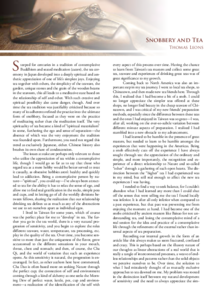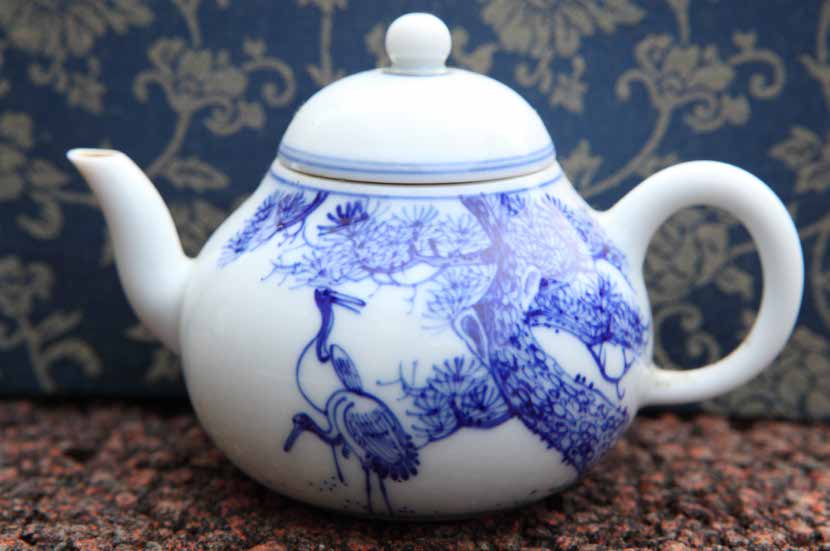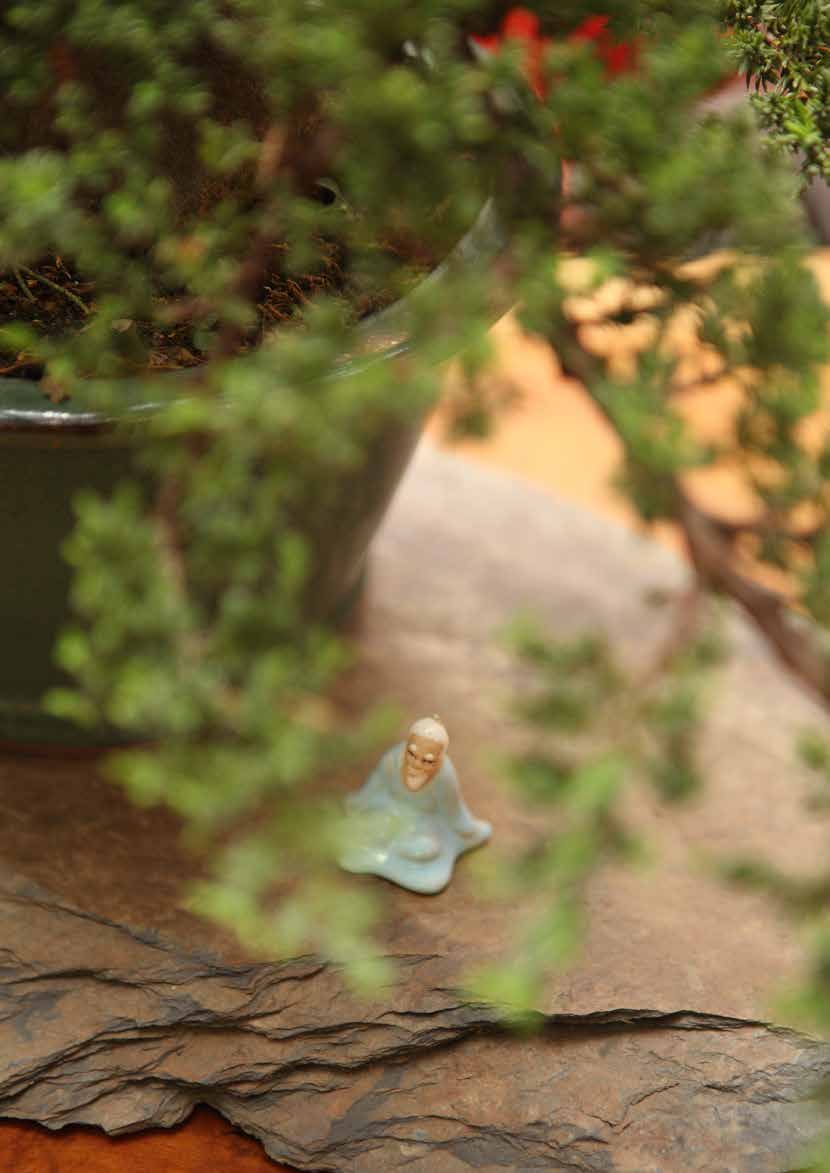
 |
|

Steeped for centuries in a tradition of contemplative Buddhism and seated meditation (zazen), the tea ceremony in Japan developed into a deeply spiritual and aesthetic appreciation of one of life's simplest joys. Enjoying tea together with others, the simplicity of the teaware, the garden, unique stones and the grain of the wooden beams in the tearoom, this all leads to a meditative state based on the relationship of self and other. With such creative and spiritual possibility also came danger, though. And over time the tea tradition was justifiably criticized because so many of its adherents refined the practice into the ultimate form of snobbery, focused as they were on the practice of meditating rather than the meditation itself. The very spirituality of tea became a kind of "spiritual materialism" in some, furthering the ego and sense of separation - the absence of which was the very enjoyment the tradition was founded upon. Furthermore, you need not regard this trend as exclusively Japanese, either. Chinese history also brushes its own share of condescension.
The issues at stake are perhaps only relevant to those who utilize the appreciation of tea within a contemplative life, though I would go so far as to say that those who regard tea as a mere hobby would be better served to treat it casually, as obsessive hobbies aren't healthy and quickly lead to addiction. Being a contemplative person by nature - "spiritual", you could say - I've always been attracted to tea for the ability it has to relax the sense of ego, and allow me to find real gratification in the rocks, simple pots and cups, and in letting go of all the worldly divisions between fellows, sharing the realization that our relationship drinking tea defines us as much as any of the abstractions we use to set ourselves apart as individual egos.
I lived in Taiwan for some years, which of course was the perfect place for me to "develop" in tea. The further you go in the tea world, there is a very natural progression of sensitivity, and you begin to explore the roles different teaware, water, temperature, tea processing, etc. play in the quality of the tea. Over time, you become sensitive to more than just the uniqueness of the flavor, grow accustomed to the different sensations in your mouth, throat, chest and stomach; and then, of course, the Cha Qi, and the world of variation that such an experience opens. As this sensitivity is natural, the progression is encouraged. In fact, as other authors here have commented, Cha Dao is often based more on seeking Nature through the perfect cup; the connection of self and environment coming through a kind of alchemy as one seeks the Morning Dew of perfect water, kettle, pot, cup and environment - a realization of the identification of the self with every aspect of this process over time. Having the chance to learn from Taiwan's tea masters and collect some great tea, teaware and experiences of drinking great teas was of great significance to my growth.
Coming back to North America was also an important step in my tea journey. I went to local tea shops, to Chinatown, and then made new tea friends here. Through this, I realized that I had become a bit of a snob. I could no longer appreciate the simpler teas offered at these shops, no longer find beauty in the cheap teaware of Chinatown, and I was critical of my new friends' preparation methods, especially since the difference between these teas and the ones I had enjoyed in Taiwan was so great - I was, after all, working on the ever-so-subtle variation between different minute aspects of preparation. I realized I had stumbled into a new obstacle to my advancement.
I had learned to be humble in the presence of great masters, but needed to learn to be humble amongst the experiences that were happening in the Americas. Being a snob effectively cuts off the experience I have always sought through tea: the appreciation of the ordinary and simple, and more importantly, the recognition and experience of a direct relationship to Nature and so-called "other" through a gathering of such open hearts. The distinction between the "higher" tea I had experienced was in my mind, but still real enough to affect the new tea experiences I was having.
I needed to find a way to seek balance, for I couldn't abandon what I had learned any more than I could shut off the senses that were telling me the tea I found locally was inferior. It is after all only inferior when compared to a past experience, but that past was preventing me from enjoying the moment at hand. I had become one of the snobs criticized by ancient masters like Baisao for not understanding tea, and losing the contemplative mind of a real session for the idea and practice of a contemplative life through the refinement of the external rather than internal aspects of tea preparation.

Recording our internal growth in the form of an article like this always makes us seem fractured, confused and crazy. This is perhaps based on the illusory nature of our thoughts as linear abstractions of a real world that is really a tangle of interconnected processes, a weave of endless relationships and patterns rather than the solid objects we perceive ourselves to be. Over time, the solution to what I had mistakenly thought of as mutually exclusive approaches to tea dawned on me. My problem was rooted in the distinction itself between my natural development of sensitivity and the need to always appreciate the simple and connect to the moment at hand, even if it is lower-quality tea, teaware and/or preparation.
I've been fortunate to have been taught from the beginning that my internal growth must keep pace with the external sensitivity and development of technique. Couldn't the same be said of any art, especially if the spiritual and aesthetic are to be in accord? I've learned without a shadow of a doubt that the real masters make better tea from within, not as a result of more knowledge or better technical skill. Cha Dao is cultivated from within, and masters are more rather than know more. Most all spiritual traditions recognize this fact, especially the Eastern ones. It was many years of Daoist and Buddhist influence that created the whole idea of Cha Dao. In other words, the tea sages of the past were already developed internally before they ever approached tea, and as a result the simple bowl with unprocessed, or simply-processed leaves floating in water was enough of a vehicle for the contemplation and companionship they were seeking. There is no doubt that this mindset could be continued throughout a growing sensitivity to better quality tea and teaware itself; and that the more beautiful teaware could further inspire such sentiments in the participants.
When the internal development keeps pace with the intellectual understanding of tea, as well as the technical skills that accompany learning to prepare tea, then there is no dilemma between the higher and lower quality tea sessions. Whatever is at hand is appreciated fully for what it is, as it is; rather than compared one against the other. The masters in Japan who really understood tea didn't criticize the beginner or compare his or her method or teaware to the better ceremony they had last week or would have a week from now, but just enjoyed the session as it was: the eternal now, and a connection to the world through simplicity, through drinking it, and through companionship with others who are also relaxing their sense of distinction as egos.
I began to treat the times with better teas and teaware and the greater sensitivity I was enjoying as unique bliss to be enjoyed when it is present, but not compared to other kinds of tea that should be without the judgment of high or low. Within such sessions, I tried letting the variations between teas, cups and methods come naturally and not scale them as better or worse, but rather more suitable to the situation at hand. When I was at the local tea shops, I looked a bit closer and realized again the beauty in a contemporary lotus on a large teapot I may have found beautiful ten years ago, but would most likely have ignored in a more snobbish mindset, having seen other more beautiful examples. However, the important point here, which cannot be over-stressed, is that those more beautiful examples were not here before me then and there. It was this pot here. And I could choose to dismiss it by comparing it to an illusory memory or enjoy it for what it was, in itself. The same for the tea and the different friends in whose company I now found myself. I had never doubted they were worth less as people, just that their skills weren't as great as other tea sessions I had enjoyed in Asia. But this comparative thought process and the resulting condemnation of this or that was paradoxically blocking me from experiencing the peace and contemplation that I had had in Asia - the very experience that I was using as a standard to qualify the tea session at hand as inferior!
On a two-week trip back to Taiwan to visit friends I decided to try experimenting with one of my teachers. Happy to see me, the two of us set out for the mountains outside Taipei to enjoy an afternoon of tea. For the first tea, I brought out a simple, low-quality green tea from China that I had bought in Canada and began to brew it in a cheap pot with simple one-dollar cups. My teacher showed me exactly what I had been seeking verification of. He simply enjoyed the tea for what it was. We were there to enjoy tea and each other's company, not to learn about tea. If he wasn't able to shut off the learning, teacher mode, I realized, he wouldn't be the teacher I knew him to be. On the contrary, his only comment was positive, that the weather, tea and mountain were splendid and that he was happy I was back in Taiwan. Later we drank some higher-quality tea, and there was never any mention of a need to compare it to the first tea. We just enjoyed it for what it was.
Recognizing the need for internal growth that parallels an exploration of tea on the intellectual or technical level was instrumental in my own Dao of tea, and I thought that it might be important to others as well. If you only explore the external aspects of tea, it will be very difficult to avoid growing into a snob, and also difficult to prevent losing touch with the simple joys that led you to tea in the first place. There is nothing wrong with developing sensitivity, or in learning how to improve the experience of tea with better tea, teaware or technique. The new sessions that result will be all the more rewarding for your work. However, your experience can do nothing for the tea that is before you in the session you now sit in. If you are having tea now with someone who prepares a different tea in a way that you have learned does not work as well and they are open to your suggestions and want to learn, you might offer them the opportunity to go home later and compare a different technique with the one they are using. But in the moment, the tea is there. It is what it is, and your connection to the relationship you share with the environment and your companions is no less real because your ego has critically deemed the experience inferior to some other that is not here and not now.
As soon as you think you have the answers and know what you are talking about, you stop learning. My meditation teacher always says that the master who desires students is not ready to be a teacher, for his desire to put others beneath him will only result in possessiveness and in the end an unhealthy relationship for both student and teacher alike. The giving must be unconditional. And the taking must be received in an empty cup. If your cup is full, you won't take the time to read, learn, practice, find teachers and all the other movements that make a life of tea worth exploring. Instead, you may find yourself withdrawing into more and more exclusive circles and speaking more than listening.
There is a modern trend of blogging, writing and discussing one's own perspective grossly more than listening and learning from the perspective of others, especially those worthy to be called teachers. There are some who can't stop listening to their own voice even when they are drinking tea, and unfortunately spend the whole session chatting with their inner self in the form of a journal or "tea review". I would suggest that if you haven't a companion to share your tea, and you can't find a teacher or master locally, in the very least listen to the tea itself rather than your own voice, as it will also have a conversation and relationship with you if you are open to it. Paradoxically, I am also suggesting that if you find yourself having tea with such a person, enjoy the unique experience for all its worth - even if you won't repeat it yourself when you are at home.

In the end, my travels back and forth to Asia have taught me to be open to whatever tea experience I stumble upon. However, this open-mindedness to enjoy the tea, teaware, and company during any tea session can't itself become an ideal or rule, lest it become another standard to compare tea sessions - in that one I was open and in that other one I was acting like a snob. We must relax and find joy in the moment through whatever tea is there. I've learned to find the same sensation in a large pot of red tea in a local café as I enjoyed once amongst silent masters in Taiwan drinking vintage puerh with antique teaware. I can still discriminate the fact that the latter was better tea, and richer experientially. But it is no less real than the red tea in the café, and the fact that I feel less connected in one situation rather than the other is an illusion. If you keep up your internal progress, and learn to shut off the mind and find contemplation in all the simple aspects of tea, it won't matter what kind of tea you're having, what teaware you're using or even where and with whom. You'll just see these sessions as different opportunities, variations in degree not in quality - the red tea offered the same completion, just to a lesser degree, in other words. In that way, you can enjoy great tea and simple tea without the need to compare or condescend. That, to me, is the spirit of tea.
Tea is more than an idealization of the form of drinking, it is a religion of the art of life.
